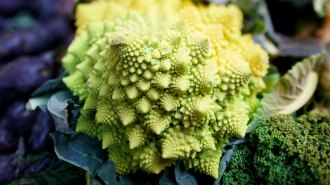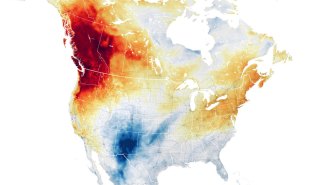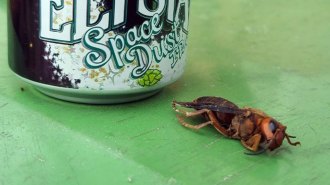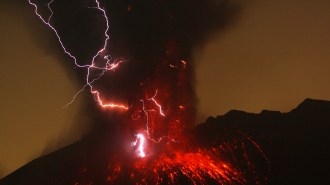Earth
Sign up for our newsletter
We summarize the week's scientific breakthroughs every Thursday.
-
 Environment
EnvironmentWhy planting tons of trees isn’t enough to solve climate change
Massive projects need much more planning and follow-through to succeed – and other tree protections need to happen too.
-
 Plants
PlantsHow Romanesco cauliflower forms its spiraling fractals
By tweaking just three genes in a common lab plant, scientists have discovered the mechanism responsible for one of nature’s most impressive fractals.
By Nikk Ogasa -
 Climate
ClimateHuman-driven climate change sent Pacific Northwest temperatures soaring
As scientists dissect what pushed temperatures up to 5 degrees Celsius above previous records, they may have to revamp how to predict heat waves.
-
 Agriculture
AgricultureA tweaked yeast can make ethanol from cornstalks and a harvest’s other leftovers
By genetically modifying baker’s yeast, scientists figured out how to get almost as much ethanol from cornstalks as kernels.
By Nikk Ogasa -
 Earth
EarthA WWII submarine-hunting device helped prove the theory of plate tectonics
With a boost from World War II, the fluxgate magnetometer became a portable and invaluable tool.
-
 Animals
AnimalsFocusing on Asian giant hornets distorts the view of invasive species
2021’s first “murder hornet” is yet another arrival. This is the not-so-new normal.
By Susan Milius -
 Earth
EarthInvisible bursts of electricity from volcanoes signal explosive eruptions
Mysterious “vent discharges” could help warn of impending explosions, a study of Japan’s Sakurajima volcano shows.
-
 Paleontology
PaleontologyFossilized dung from a dinosaur ancestor yields a new beetle species
Whole beetles preserved in fossilized poo suggest that ancient droppings may deserve a closer look.
By Nikk Ogasa -
 Climate
Climate3 things to know about the record-smashing heat wave baking the Pacific Northwest
Road-buckling, cable-melting, life-threatening heat waves in the Pacific Northwest may become more common as global temperatures rise.
-
 Animals
Animals‘Fathom’ seeks to unravel humpback whales’ soulful songs
The film ‘Fathom’ on Apple TV+ follows the quest of researchers on the ocean’s surface to decipher the eerie symphony of humpback whale calls below.
By Jake Buehler -
 Earth
EarthA satellite’s view of a deadly 2019 eruption could improve volcano monitoring
Monitoring volcanoes from space could enhance scientists’ understanding of, and ability to predict, even small eruptions.
By Nikk Ogasa -
 Climate
ClimateCollapse may not always be inevitable for marine ice cliffs
Runaway collapse of ice cliffs could dramatically boost sea level. But these cliffs may not be so vulnerable, new simulations suggest.
By Sid Perkins